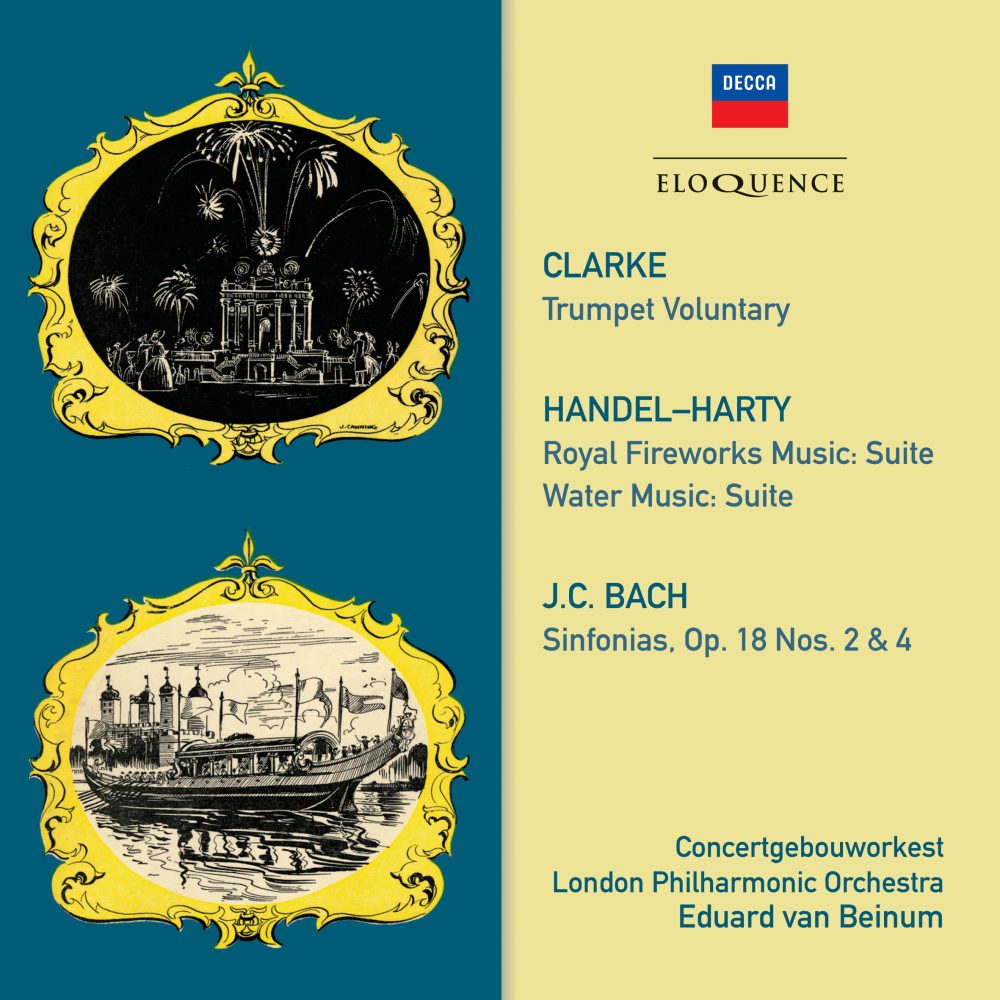This unique collection, newly remastered from original Philips recordings, documents the work of Dutch conductor, Eduard van Beinum, in Baroque and Rococo repertoire. Thanks to his celebrated recordings of Romantic composers – many of them reissued on previous Eloquence releases – such as Berlioz (482 5569), Brahms (442 9788) and Bruckner (480 7068), the conductor has a solid reputation as a classically unfussy, clear-sighted guide through the formal intricacies of large-scale symphonies. His score-driven approach and highly tuned ear for orchestral colour also made him a renowned conductor of Russians such as Tchaikovsky (480 4849) and Rimsky-Korsakov (482 511) as well as English composers including Elgar (480 4249) and Britten (480 2337).
In fact these virtues stand him in fine stead for the ‘Fireworks’ and ‘Water Music’ of Handel as some of the most extrovert large-ensemble works from the Baroque era. Eloquence has already issued Van Beinum’s 1958 Philips recording of the complete ‘Water Music’ with the Concertgebouw Orchestra (461 3362). This set presents a suite from the Water Music compiled and re-orchestrated by the English conductor, Sir Hamilton Harty, recorded for Decca with the London Philharmonic Orchestra. The conducting matches Harty’s arrangement in grand style with a warm legato string sound. Originally coupled with Mozart’s ‘Haffner’ Symphony on the reverse side, the recordings were described in Gramophone (November 1950) ‘well-disciplined and energetic readings’.
The ‘Fireworks Music’ also for Decca and in Harty’s arrangement, dates from two years later, in sessions with the Concertgebouw that also included the ‘Trumpet Voluntary’ of Jeremiah Clarke. Van Beinum had a particular way with such brief showpieces (see also the Eloquence anthology of Concertgebouw Lollipops, 482 5650); in 1956 when the 25th anniversary of his first appearance with the orchestra was celebrated, the Concertgebouw played the ‘Trumpet Voluntary’ once more.
That same year, van Beinum added the Symphony Op. 18 No. 4 by Johann Christian Bach to his repertoire; he had already performed No. 2 from the set which had in previous years been associated with his predecessor as the orchestra’s Music Director, Willem Mengelberg. Van Beinum’s recording is quite different though no less imposing. What makes these performances still very attractive, even after six decades, is the great musical joy that they express. The outer movements shine with an incandescent vitality. The tuttis are powerful and sonorous, thanks to the deep and rich sound for which the Concertgebouw Orchestra had become so famous. These J.C. Bach recordings are among the last made by Van Beinum. Six months later, on 13 April 1959, he died while rehearsing Brahms with the Concertgebouw.
JEREMIAH CLARKE arr. SIR HENRY WOOD
Trumpet Voluntary
GEORGE FRIDERIC HANDEL arr. HAMILTON HARTY
Music for the Royal Fireworks: Suite*
Water Music Suite*
JOHANN CHRISTIAN BACH
Sinfonia in B flat major, Op. 18 No. 2*
Sinfonia in D major, Op. 18 No. 4*
Concertgebouworkest
London Philharmonic Orchestra
Eduard van Beinum
*FIRST INTERNATIONAL RELEASE ON DECCA CD
Recording Producers: John Culshaw (Clarke, Handel/Harty: Fireworks Music); Victor Olof (Handel/Harty: Water Music); Jaap van Ginneken (J.C. Bach)
Balance Engineers: Kenneth Wilkinson (Clarke; Handel/Harty: Fireworks Music, Water Music); Henk Jansen, Cees Huizinga, Willem van Leeuwen (J.C. Bach)
Recording Locations: Kingsway Hall, London, UK, 5 May 1950 (Handel/Harty: Water Music); Grote Zaal, Concertgebouw, Amsterdam, The Netherlands, 19 May 1952 (Clarke, Handel/Harty: Fireworks Music); 6–7 October 1958 (J.C. Bach)
Original LP Releases: Decca LX 3096 (Clarke, Handel/Harty: Fireworks Music); Decca LXT 2792 (Handel/Harty: Fireworks Music, Water Music); Philips G05378R, Philips Epic BC 1112 (J.C. Bach)
‘The LPO, in the Water Music, show a fine Handelian style.’ Gramophone, November 1952
‘The Trumpet Voluntary [is] explosively performed … satisfying both for the rightness of conception and the vividly illuminating orchestral playing.’ High Fidelity, January/February 1953

